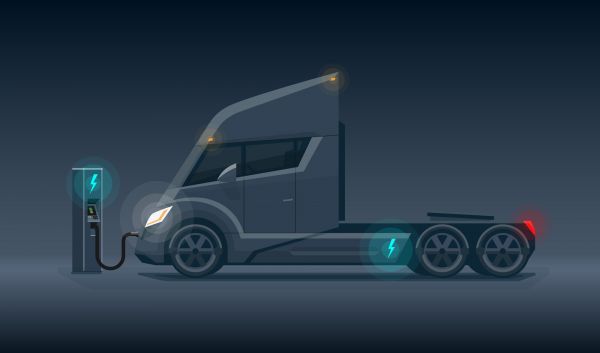The Rise of Electric Trucks and Commercial Vehicles in the USA and Canada
wordpress-Default July 1, 2024 0 COMMENTS
Electric vehicles (EVs) have gained significant traction in recent years, with electric trucks and commercial vehicles emerging as a vital segment within the broader EV market. The shift from traditional internal combustion engine (ICE) vehicles to electric-powered alternatives promises to revolutionize the logistics and commercial transportation industries in both the USA and Canada. This blog will delve into the rise of electric trucks and commercial vehicles, exploring the benefits, challenges, and key players driving this transformation.
The Growing Demand for Electric Trucks
As environmental concerns and stringent emissions regulations intensify, the demand for cleaner transportation solutions has surged. Electric trucks and commercial vehicles are at the forefront of this shift, offering a sustainable alternative to diesel and gasoline-powered counterparts. Several factors contribute to the growing demand for electric trucks:
- Environmental Impact: Transportation is a significant source of greenhouse gas emissions. Electric trucks produce zero tailpipe emissions, reducing the carbon footprint and improving air quality. This is particularly crucial in urban areas, where air pollution is a pressing concern.
- Cost Savings: While the upfront cost of electric trucks can be higher than traditional vehicles, the total cost of ownership is often lower. Electric trucks have fewer moving parts, leading to reduced maintenance costs. Additionally, electricity is generally cheaper than diesel or gasoline, resulting in lower fuel expenses.
- Government Incentives: Both the USA and Canada offer various incentives to promote the adoption of electric vehicles. These include tax credits, rebates, and grants for purchasing electric trucks and investing in charging infrastructure.
- Technological Advancements: Rapid advancements in battery technology have significantly improved the range and performance of electric trucks. Modern electric trucks can now cover longer distances on a single charge, making them viable for a wide range of commercial applications.
Key Players in the Electric Truck Market
Several companies are leading the charge in developing and deploying electric trucks and commercial vehicles in North America. These key players are driving innovation and setting new standards for the industry:
- Tesla: Tesla’s Semi truck is one of the most anticipated electric trucks on the market. With impressive range capabilities and advanced autonomous features, the Tesla Semi aims to revolutionize long-haul trucking. Tesla’s commitment to expanding its Supercharger network also supports the adoption of electric trucks.
- Rivian: Rivian is another prominent player in the electric truck market. The Rivian R1T, an electric pickup truck, has garnered significant attention for its off-road capabilities and innovative design. Rivian is also developing electric delivery vans for Amazon, highlighting its versatility in the commercial vehicle sector.
- Nikola Motor Company: Nikola focuses on hydrogen fuel cell electric trucks, offering an alternative to battery-electric vehicles. Their Nikola One and Nikola Two trucks are designed for long-haul applications, with hydrogen fueling infrastructure being a critical component of their strategy.
- BYD: BYD, a Chinese automaker, has made substantial inroads into the North American market with its electric buses and trucks. BYD’s electric trucks are used for a variety of applications, including refuse collection and urban delivery.
- Ford: Ford’s F-150 Lightning, an electric version of the popular F-150 pickup truck, is set to be a game-changer in the market. With a substantial range and competitive pricing, the F-150 Lightning aims to attract both individual and commercial buyers.
Benefits of Electric Trucks and Commercial Vehicles
The transition to electric trucks and commercial vehicles offers numerous benefits, making them an attractive option for businesses and municipalities:
- Reduced Emissions: Electric trucks produce no tailpipe emissions, significantly reducing air pollution and greenhouse gas emissions. This is particularly beneficial in densely populated urban areas where air quality is a major concern.
- Lower Operating Costs: Electric trucks have fewer moving parts than ICE vehicles, resulting in lower maintenance costs. Additionally, electricity is often cheaper than diesel or gasoline, leading to significant savings on fuel expenses.
- Improved Efficiency: Electric motors are more efficient than internal combustion engines, converting a higher percentage of energy into movement. This results in better performance and lower energy consumption.
- Quieter Operation: Electric trucks operate more quietly than their diesel counterparts, reducing noise pollution. This is especially advantageous for urban delivery vehicles operating in residential areas.
- Energy Independence: By adopting electric trucks, businesses can reduce their reliance on fossil fuels and hedge against volatile fuel prices. This shift aligns with broader efforts to transition to renewable energy sources.
Challenges and Solutions
Despite the numerous advantages, the adoption of electric trucks and commercial vehicles is not without challenges. Addressing these challenges is crucial for the widespread adoption of electric commercial vehicles:
- Range and Charging Infrastructure: One of the primary concerns with electric trucks is range anxiety and the availability of charging infrastructure. While advancements in battery technology have extended the range of electric trucks, the development of a robust and widespread charging network is essential. Governments and private companies must collaborate to build high-speed charging stations along major transportation routes.
- Initial Cost: The upfront cost of electric trucks can be higher than traditional vehicles due to the cost of batteries. However, as battery prices continue to decline and economies of scale are realized, the cost differential is expected to decrease. Government incentives and subsidies can also help offset the initial investment.
- Battery Technology: Battery weight and energy density remain challenges for electric trucks, especially for long-haul applications. Ongoing research and development in solid-state batteries and other advanced technologies promise to address these issues, offering higher energy densities and lighter weights.
- Infrastructure Upgrades: The widespread adoption of electric trucks will require upgrades to the electrical grid to handle increased demand. Investments in grid infrastructure and smart grid technologies are necessary to ensure reliable and efficient power delivery.
- Training and Education: The transition to electric trucks necessitates training for drivers and maintenance personnel. Businesses and educational institutions must collaborate to develop training programs that equip the workforce with the necessary skills to operate and maintain electric vehicles.
The Future of Electric Trucks in the USA and Canada
The future of electric trucks and commercial vehicles in North America looks promising. Both the USA and Canada are committed to reducing carbon emissions and promoting sustainable transportation solutions. As battery technology continues to advance, and charging infrastructure expands, electric trucks will become an increasingly viable option for a wide range of commercial applications.
Governments, businesses, and consumers must work together to overcome the challenges and fully realize the benefits of electric trucks. By investing in research and development, incentivizing adoption, and building robust infrastructure, North America can lead the way in the transition to a cleaner, more sustainable transportation future.
The rise of electric trucks and commercial vehicles represents a significant step towards a greener and more efficient transportation system in the USA and Canada. With the continued support of government policies, technological advancements, and industry collaboration, the widespread adoption of electric trucks is not just a possibility but an inevitable reality.








